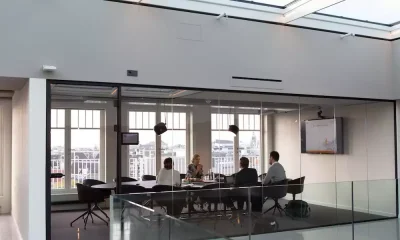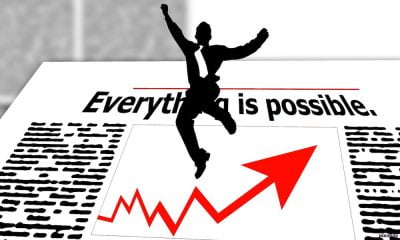Innovation
Starting A New Business In A Recession

In business, there have been some surprising winners and losers during COVID-19.
Accountants are always winners as they are pandemic-proof and recession-proof. Irrespective of what is going on in the world the two certainties in life are death and taxes so if you have a thing for numbers then be an accountant. For everyone else, there are opportunities to explore, even when setting up a business in a recession seems ludicrous.
Recession-Proof Businesses
There have been many successful examples of household names that started their business during a recession with Huffpost naming Microsoft, IBM, General Motors, CNN, Apple.
During the coronavirus pandemic, healthcare suppliers have been busy, and with demand exceeding supply, manufacturers of other products currently not in demand have swiftly changed tact to produce PPE (personal protective equipment). Through doing so, they have turned their fortunes around to become winners.
Recession-proof businesses usually include cafes, movie theatres, and bakeries due to consumers electing to spend less on eating out and entertainment. However, you’d be right to be a little hesitant in setting up any one of these businesses now.
Take It Online
With most regions experiencing a lockdown, non-essential businesses have been closed including cafes, movie theatres, and bakeries and many will not survive the non-trading period. Therefore they will not open with a physical presence again. This is a harsh reality facing many unprepared business owners. Hence, they need to look to their ‘chameleon-like’ peers who have seen an opportunity in the adversity that is the pandemic. These companies have adapted to change and taken their physical business online and through doing so, have a high chance of doing well in what likely lies ahead – a deep recession.
SmartCompany says there was a 35% drop in physical retail demand after the GFC, and during SARS people were afraid to go outside.
Social Distancing
We are living this life now, with social distancing, one of the most searched terms in Google. Peak popularity occurred during 22 – 28 March, and it’s still a top search term, due to social distancing now the new normal. It’s the unknowns of coronavirus that will see social distancing a prerequisite for public places and events for months if not years to come.
Therefore over the past few months what we’ve realised is startups that operate online or have an online store have a chance to do well during a pandemic and economic downturn. For example, drive-through cafes and bakeries that can take orders online for either ‘click and collect’ or home deliveries adhere to our need for social distancing. What they also do is provide a sense of normalcy which is called for during the current controls on our movements.
The take-out coffee and sweet treats are what most urban dwellers can not do without.
Death Of The Physical Store?
Amazon’s growth during the pandemic proves online shopping was always going to win out over the physical retail environment. So the question on most of our lips is what will become of the shopping mall? It’s hard not to see these large footprints becoming white elephants, maybe the buildings can be turned into residential living quarters like townhouses and apartments.
The physical retail outlet has been surviving while the technology needed for online shopping was developed to enhance the shopping experience and provide a safe and secure sale transaction. Over the past few years, many retailers created their online shops as a way to secure the sale. Witnessing consumers visiting their store to try on merchandise but often not to purchase it, without the online presence the sale was wouldn’t happen.
Consumers can be in the physical store yet purchase online, there can be great synergy between the physical and online operations where having a physical presence with lots of foot traffic makes sense.
For everyone else, the offline store is being ditched in favour of an online option only. This has been a brave move for clothing retailers like Marcs in Australia, who closed all their physical stores in New Zealand, but the risk has been worth it. Their costs are much lower, and they’ve been passed onto the consumer with lower prices, making the business more competitive in a country with an abundance of women’s clothing stores and the benefit of a better exchange rate.
ChatBots & Virtual Tours
Nowadays shopping journeys start online and with 360-degree visuals, videos, virtual tours and close-ups of garments, as well as smart features like size charts including the option of uploading an outline of your foot to get your shoe size.
The only major challenge that remains for eCommerce stores is cart abandonment. The introduction of retail chatbots has improved conversion rates and the smarter the chatbot, i.e. if it is using AI to intelligently work out when to switch from a robotic reply to a real person, the greater the rate of conversion.
Marketing
Whatever business you’re in, marketing is a massive part of it, so you will need a reasonable budget, and focus on digital marketing strategies grow your reach. This is also where machine learning helps with the data capture. Then your marketing can be more targeted with personalised email marketing, sending emails that are unique to the recipient to get the vital click to your website and online store.
Social media and online advertising, e.g. Google and Facebook ads, as well as influencer marketing, need to be a big part of the marketing spend. Plus your website will need a high SEO score which requires lots of unique, relevant content on your blog and backlinks to your site from referring blogs.
While starting a business during a recession may appear unnatural, look at all the household names still around today because they saw something others did not.
Finally, remember there is no such thing as an overnight success – it is likely to take seven to ten years, but who’s counting!









